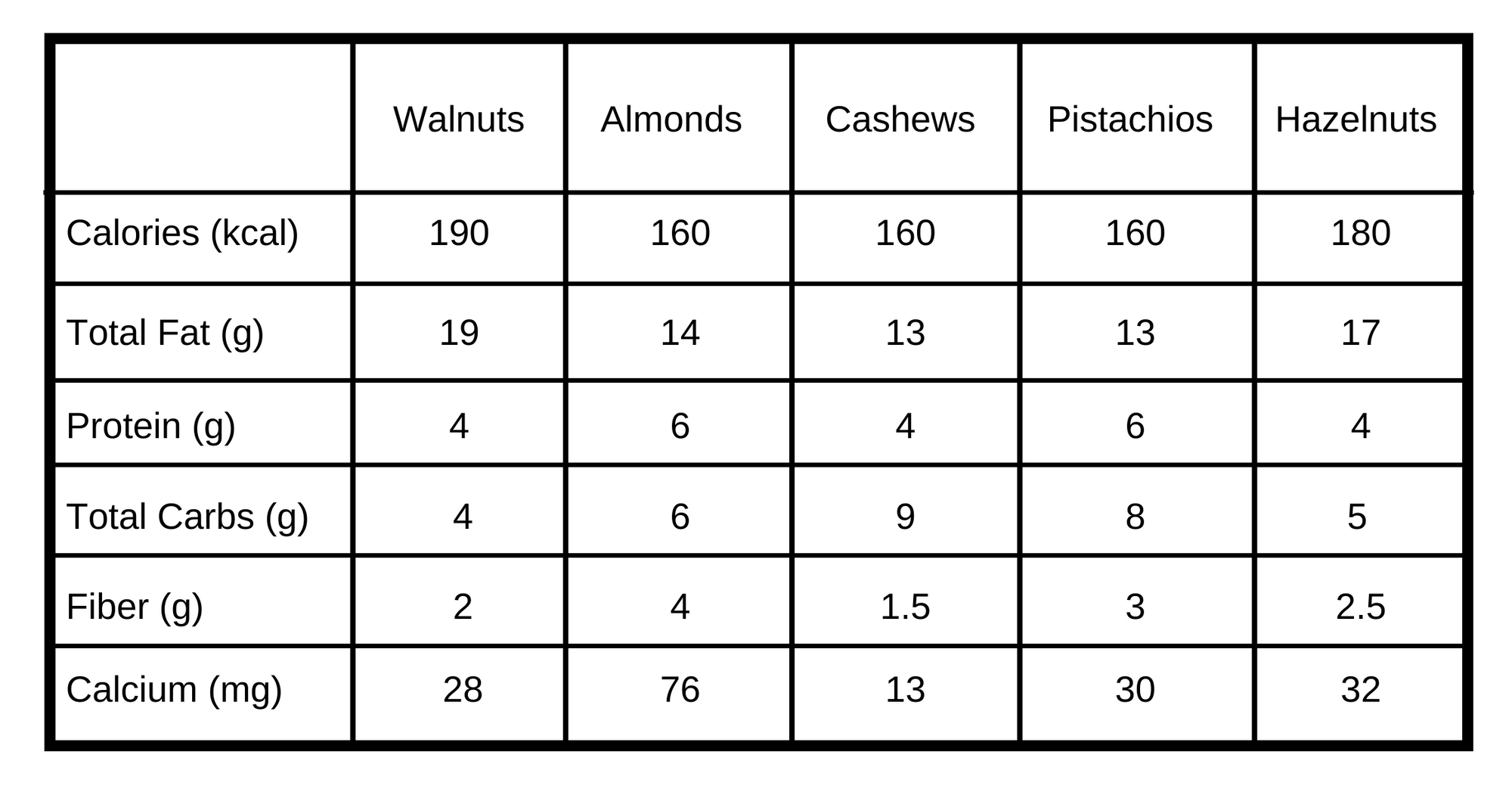Nuts make a great snack and a tasty spread in our sandwich, but there are other compelling reasons we should be eating nuts regularly for our health.
You may have heard the buzz around nuts as a healthy source of nutrition, but their exact benefits are not always understood. Check out these facts below to discover exactly how nuts can enhance your health.
1. A handful of nuts a day is an easy way to load up on antioxidants. Nuts are filled with healthy unsaturated fats, protein, dietary fiber, and vitamins K, E, and thiamine, as well as minerals like magnesium, copper, and potassium. Perhaps lesser known is that nuts are also a powerful source of polyphenol antioxidants, fighting and preventing chronic diseases and inflammation in the body. In fact, it is shown that eating five ¼ cup servings, or a handful, of nuts per week can reduce the risk of overall death by 18%. All nuts are good for health, but when it comes to nutrition, walnuts are the clear winner. Walnuts provide the most antioxidants and beneficial omega-3 fatty acids, boasting three to six times more antioxidants than peanuts, almonds, and hazelnuts.
2. When nuts are roasted, they lose some of their nutrition. We enjoy roasted nuts for their crunchy texture and rich flavor, but we may be giving up a bit of nutrition by doing so. The nut roasting process involves chemical and structural changes that reduce levels of antioxidants and vitamins, particularly those found in a nut’s outer peel. One study found that roasting raw pistachios at 140°F for 20 minutes reduced their total antioxidant count by more than half. Of course, salt is usually added to roasted nuts, and chomping on more than one serving can quickly drive up your daily sodium, so stick to raw to keep your sodium in check and reap the most antioxidant benefits.
3. Eating nuts will not cause you to gain weight. Nuts are made up of 50-75% fat, so it is not surprising that many steer clear of these calorie-dense foods. But overwhelming evidence suggests that people who eat nuts regularly are not any more likely to gain weight. Research actually shows that those who eat nuts twice a week are 31% less likely to gain weight than those who do not eat nuts, and some studies even show that there is an inverse relationship between eating nuts and weight gain. What explains this? Nuts are so rich in protein, fiber, and healthy fats that they keep you feeling full, potentially replacing unhealthy calories from other foods you would otherwise eat.
4. Nuts have a powerful cholesterol-lowering effect. Nuts’ high fat content consists mainly of monounsaturated fat, and replacing this heart-healthy fat with the saturated fat in your food leads to reduced cholesterol, lower triglycerides, and improved blood vessel health. Evidence suggests that eating four or more servings of nuts per week can lower your heart disease risk by 37%, a premise confirmed by one study that showed that eating 1/3 cup of nuts per day can reduce total cholesterol by 10.9 mg/dL, lower LDL cholesterol by 10.2 mg/dL, and reduce triglycerides by 20.6 mg/dL.
5. Nuts may be especially helpful for type 2 diabetes . The American Diabetes Association touts nuts as a diabetes superfood that is key to managing hunger and beneficial for overall health, and the latest science now confirms that nuts have the ability to lower blood sugar for those with diabetes. One such study revealed that when subjects ate ¼ cup of nuts daily over 8 weeks, their HbA1c lowered by 0.07% and fasting glucose reduced by 0.15 mmol/L. This effect may again relate to the fact that since eating nutrient-dense nuts helps to fill you up, you are less likely to indulge on other carb-heavy foods.
6. Nut butters can be as healthy as whole nuts - as long as you eat the right kind. Like plain nuts, nut butters offer a variety of vitamins and minerals, as well as a satiating dose of fiber, protein, and heart-healthy monounsaturated fats. But whether nut butters are beneficial for your health or not depends on the type you purchase. Plenty of brands include excess salt and sugar, and a jar that claims “no stir” likely means it has harmful partially hydrogenated or hydrogenated oils for easy spreading. So skip butters with any additives and stick to natural nut butters with only one ingredient - your nut of choice.
How does your favorite nut compare with the rest?
See how the most popular nuts stack up nutritionally in the table below.


Chocolate Hazelnut Spread
Ditch the store-bought jar filled with refined sugar, oil, emulsifiers, and artificial flavors and whip up this velvety spread made with simple ingredients you can recognize. Heart-healthy hazelnuts meet antioxidant-rich cocoa powder in this creamy, sweet treat.
Makes 2 ½ cups
Ingredients
3 cups raw, unsalted hazelnuts
½ tsp sea salt
1 tsp vanilla
3 Tbsp unsweetened cocoa powder
1-2 Tbsp coconut sugar or brown sugar
Instructions
1. Preheat oven to 350F.
2. Spread hazelnuts onto a baking sheet in a single layer, and roast for 12-15 minutes. This will loosen the skins and warm the hazelnuts to make them easier to blend into butter.
3. Once roasted, remove the hazelnuts and let cool for a minute or two. Transfer all the hazelnuts onto a clean towel and roll them around with your hands to remove as many of the skins as possible.
4. Add hazelnuts to a high-speed blender or food processor, and blend on low until a butter forms, scraping down the sides when necessary. This could take up to 10 minutes.
5. Add the cocoa powder, sea salt, and vanilla into the butter and continue to blend.
6. Add sugar to sweeten, blending until smooth, and add a bit more sugar if more sweetness is desired.
7. Transfer to a clean jar, and store at room temperature for up to 2-3 weeks.






